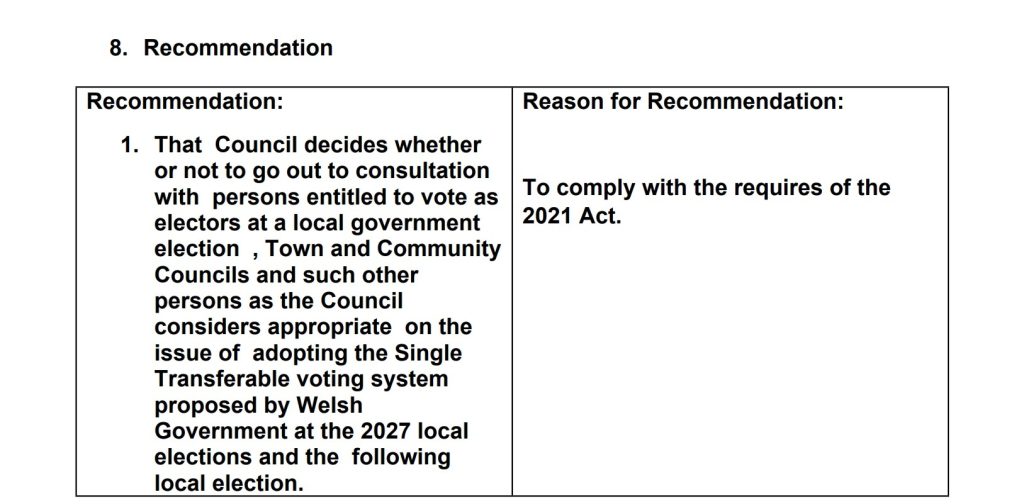AT the next local elections in 2027, residents might be voting for their Powys County Council representatives under a form of proportional representation allowed under a new law in Wales.
At the council meeting on Thursday, October 5, councillors were due to discuss the merits of a type of proportional representation called Single Transferable Vote (STV).
If the agreed to STV public consultation on the changes would then need to take place
But arguments were put forward that the wording of the report was not clear enough on what was supposed to be debated.
Also, the report on STV had not been published with the main meeting agenda on Thursday, September 29.
It followed on late and was published in a “supplementary agenda” pack late on Monday afternoon, October 2.

Conservative Cllr Pete Lewington said: “The recommendation asks the council to decide whether or not to go out to consultation with the reason being that it’s a requirement of the Act.
“It’s wrong to imply that we have a choice – my understanding of the law is that we have to consult, so in effect there’s nothing for us to decide today.
“However, there is an important point for us to address before we go to consultation, which is whether full council decides to move to STV.”
He asked for the item to be withdrawn so that STV can be fully debated at a future meeting.
Head of legal services, Clive Pinney believed the issue was “simple,” that councillors “agree to go out to consultation or not.”

Conservative Cllr Amanda Jenner argued the wording in the Act itself said that Powys would “have to go out to consultation” if they went down the STV route and that that this was not the wording of the recommendation.

Mr Pinney responded and said: “It’s for council today to consider STV and if they do to go to consultation”.
Cllr Jenner said: “This is a huge debate for us to consider and both sides of the argument would want to come back with their reasoning and research.”
Mr Pinney stressed that he was “satisfied” that the decision could be made and there was “nothing wrong” with the recommendation.
“I’m sorry if the wording is imprecise,” said Mr Pinney.
Cabinet member for a safer Powys, Liberal Democrat Cllr Richard Church asked if it was possible to hold the consultation needed within the “required timetable” if the discussion was postponed to the next meeting – which is on December 7.
There is a deadline of November 15, 2024, for everything to be in place if the next election is to be held under STV.
Mr Pinney said: “It would still be possible to achieve that deadline.”
Interim chief executive Jack Straw said: “We’ve made a simple thing really complicated – for me it was clear that the council would consider STV and if it does – you have to consult.
“You’re not making a final decision on it (today).”
Cllr Lewington then put forward a motion to postpone the discussion until December 7 which was seconded by Cllr Jenner.
Councillors voted by 34 to 25 to discuss STV at their meeting on December 7.
How does Single Transferable Vote (STV) work?
The Single Transferable Vote (STV) is a form of proportional representation which is already in use in several countries.
This includes Northern Ireland, the Republic of Ireland, Malta, Scotland, Estonia, and Australia for some of their elections.
The Local Government and Elections (Wales) Act 2021 allows local authorities in Wales to choose to adopt STV as the type of electoral system to be used after 2027 instead of the current First Past the Post System
But before that can happens there are several hurdles for the voting change to jump over.
If on December 7 the council does support STV a period of consultation will need to take place.
The findings of the consultation would need to be sifted through and then debated again by councillors.
The law also stipulates that a vote with a two thirds majority is needed at a special council meeting in favour of the changes.
This threshold potentially would be 45 of 68 Powys councillors need to vote in favour of STV.
All this needs to be done by November 15, 2024.
If it does come into force for the 2027 local election, the council ward system in Powys would also need to be changed.
Powys would continue to have 68 county councillors, but the wards would be changed from the current 52 single and eight multi member wards to all multi member wards.
The number of multi member wards could vary from 12 to 23.
And this means the number of councillors elected in the new multi-member wards would be from three to a maximum of six.
For example- voters who live in a ward that elects three councillors would be expected to rank them in terms of preference – one, two or three and the top three candidates would be then elected.
All this would be looked at by the Local Democracy and Boundary Commission for Wales and their recommendations on the alterations would need to be approved by the Welsh Government.
If implemented it would be in place for at least two elections.


















